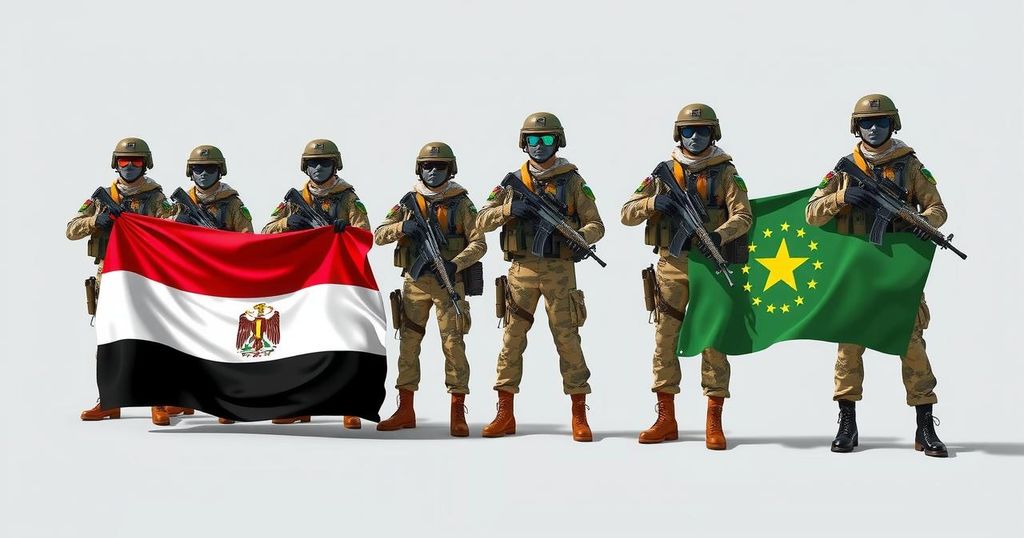Egypt, Eritrea, and Somalia Forge Alliance Amid Ethiopian Tensions

Egypt is enhancing its strategic partnership with Eritrea and Somalia in response to threats posed by Ethiopia. Leaders convened for a summit in October 2024 to bolster military cooperation and support Somalia’s counterterrorism efforts. This trilateral alliance emerges amid tensions over the Grand Ethiopian Renaissance Dam and Ethiopia’s agreement with Somaliland, indicating a significant regional shift in power dynamics.
In light of perceived threats from Ethiopia, Egypt has been enhancing its strategic collaboration with Eritrea and Somalia. A pivotal summit took place in Asmara in October 2024, where the leaders of the three nations committed to strengthening military cooperation and fostering regional stability. This partnership includes Egypt’s pledge to support Somalia’s counterterrorism operations, notably through troop deployment as part of the African Union mission, aimed at counterbalancing Ethiopia’s expanding regional influence.
The alliance has its roots in the contentious relationship between Egypt and Ethiopia over the Grand Ethiopian Renaissance Dam (GERD), which Egypt considers a direct threat to its water security. Additionally, a recent agreement between Ethiopia and Somaliland concerning maritime access has heightened tensions, prompting Somalia to align more closely with Egypt and Eritrea. Analysts characterize this trilateral cooperation as a strategic maneuver by Egypt to assert its dominance amidst ongoing disputes surrounding Nile water rights and access to key maritime routes in the Red Sea.
Ethiopia’s efforts to regain maritime access via its partnership with Somaliland have raised concerns for Somalia regarding its territorial sovereignty, compelling both Egypt and Eritrea to reinforce military and strategic ties with Mogadishu. This partnership encompasses not just diplomatic efforts but extends to military assistance, including arms transfers to Somalia, alongside the creation of a joint committee of foreign ministers to facilitate ongoing strategic collaboration.
As tensions continue to escalate, this newly formed alliance has the potential to alter the balance of power within the region, possibly leading to intensified diplomatic and military confrontations. The forthcoming months are expected to be critical in assessing the impact of this strategic alignment on existing disputes over vital water and maritime rights.
The current geopolitical landscape in the Horn of Africa is marked by increasing complexity, particularly concerning relations between Egypt, Ethiopia, and neighboring nations. Central to these dynamics is the disagreement over the Grand Ethiopian Renaissance Dam (GERD), which Ethiopia is constructing on the Blue Nile River. Egypt, entirely reliant on the Nile for its freshwater supply, perceives this dam as an existential threat to its water security. Additionally, Ethiopia’s recent cooperation with Somaliland regarding maritime access intensifies regional tensions and compels Egypt and its allies to respond strategically. The meeting that took place in Asmara signifies a strategic response from Egypt and its allies, aiming to curb Ethiopia’s regional aspirations and reinforce stability in Somalia amidst rising threats. This context has fostered a realignment of alliances in the Horn of Africa, with the potential to reshape the region’s power dynamics significantly.
The strengthening of alliances among Egypt, Eritrea, and Somalia represents a critical shift in the geopolitical landscape of the Horn of Africa, primarily driven by the perceived threat from Ethiopia. As these nations collaborate militarily and diplomatically, the balance of power may pivot dramatically. The strategic implications of this coalition, set against the backdrop of disputes over water and maritime access, emphasize the need for continued observation of developments in the region in the coming months.
Original Source: www.garoweonline.com








